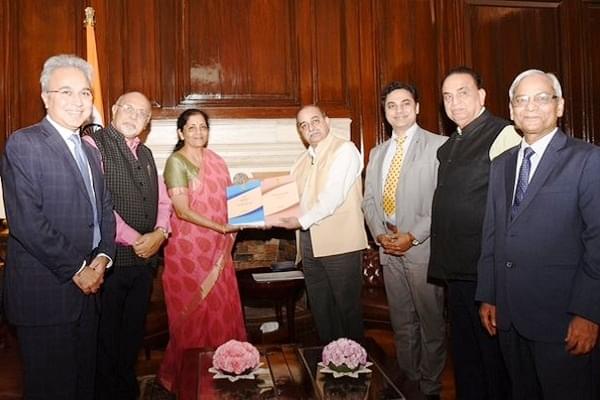News Brief
Direct Tax Code Task Force Recommends Pathbreaking Changes To Income Tax Act; Big Perks For Middle Class, Corporates
Swarajya Staff
Aug 20, 2019, 02:30 PM | Updated 02:30 PM IST
Save & read from anywhere!
Bookmark stories for easy access on any device or the Swarajya app.


The Direct Tax Code (DTC) task force, set up to overhaul the 58-year-old Income Tax Act, has reportedly recommended a significant increase in the highest income tax slabs, besides reducing corporate tax rate to an even rate of 25 per cent for both domestic and foreign companies, CNBC TV-18 reported.
Akhilesh Ranjan, Convener of the task force constituted by the Government to draft New Direct Tax Law, submitted the report to Union Minister of Finance and Corporate Affairs Nirmala Sitharaman in New Delhi yesterday (19 August).
The task force was supposed to submit its report by 31 May, but the then finance minister Arun Jaitley gave it a two months extension to complete the exercise.
The panel was originally supposed to submit its report to the government, within six months, by 22 May 2018, but its term was further extended till 22 August. Following Arbind Modi's retirement on 30 September 2018, the Akhilesh Ranjan-led panel was tasked to submit report by 28 February. It was then extended till 31 May.
The other committee members include Girish Ahuja (chartered accountant), Rajiv Memani (Chairman and Regional Managing Partner of EY), Mukesh Patel (Practising Tax Advocate), Mansi Kedia (Consultant, ICRIER) and G C Srivastava (retired IRS and Advocate). Central Board of Direct Taxes (CBDT) is the apex policy-making body of the Direct Tax department.
Prime Minister Narendra Modi, while addressing the annual conference of tax officers in September 2017, had observed that the Income-tax Act, 1961, was drafted over 50 years ago and hence needed to be redrafted.
The task force was assigned to draft direct tax laws in line with the norms prevalent in other countries, incorporating international best practices, and keeping in mind the economic needs of the country.
A CNBC-Taxsutra exclusive report provided the details of various recommendations by the task force:
- The task force is said to have recommended significant relief for the middle class and individuals earning up to Rs 50 lakh per annum.
- The task force is also understood to have given its recommendation on three contentious issues for the corporate sector –— tax on long term capital gain (LTCG), dividend distribution tax (DDT) and minimum alternative tax.
- The task force is said to have proposed a 25 per cent corporate tax rate for both domestic and foreign companies and a levy of branch profits tax on foreign companies. The task force is likely to have recommended the elimination of Dividend Distribution Tax and said that the onus of payment should be on the dividend recipient.
- The task force has also recommended radical changes in the assessment process including establishment of “assessment units” which represents a departure from the current practice of 'assessing officers' conducting assessments.
- The panel is said to have called for reorganising the tax department in terms of “functional units' established based on IRS officers’ sectoral specialisation.
- The task force is learnt to have recommended settling tax disputes through mediation between the taxpayer and a collegium of officers and establishing litigation management unit to manage the entire tax litigation process.
- The task force has also proposed a “public ruling' option to let taxpayers approach the Central Board of Direct Taxes (CBDT) for clarifications.
The report will be expected to be placed for stakeholder consultations and is likely to be placed in Parliament as a part of Union Budget 2020-21.





